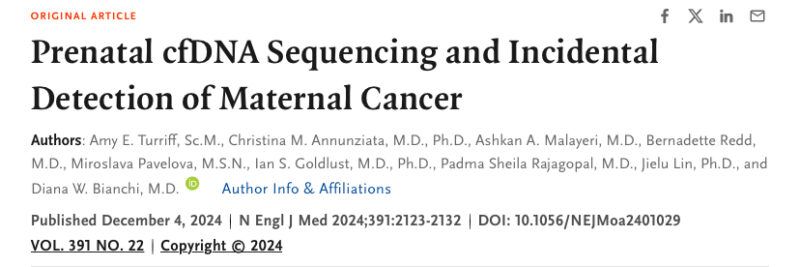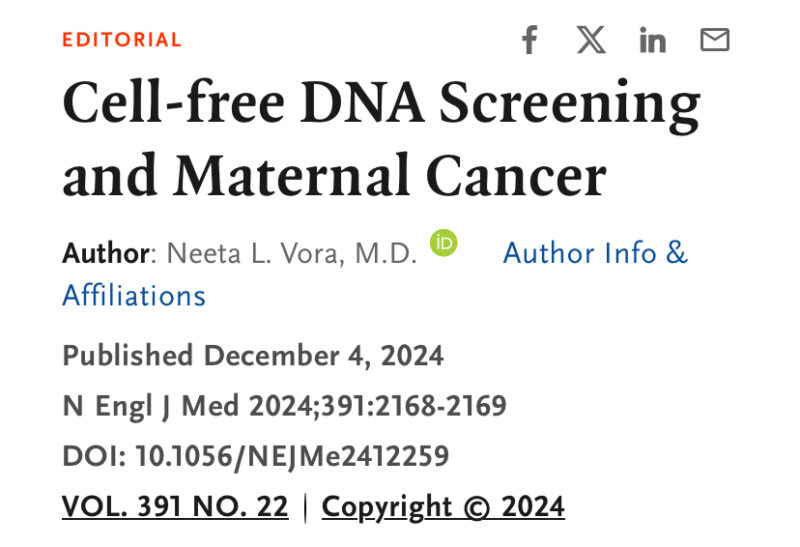Research Highlights the Potential of cfDNA Sequencing and Whole-Body MRI in Detecting Maternal Cancer During Pregnancy
A study titled “Incidental Detection of Maternal Neoplasia through Noninvasive Cell-free DNA Analysis (IDENTIFY)” has shown that cancer was detected in 48.6% of participants who received nonreportable or atypical cell-free DNA (cfDNA) sequencing results during prenatal screening.
The findings were published on December 4, 2024, in The New England Journal of Medicine by Dr. Diana W. Bianchi and colleagues from the US National Institutes of Health.
 Photo of Diana W. Bianchi taken from genome.org
Photo of Diana W. Bianchi taken from genome.org
Prenatal cfDNA Sequencing and Incidental Detection of Maternal Cancer
Authors: Amy E. Turriff, Christina M. Annunziata, Ashkan A. Malayeri, Bernadette Redd, Miroslava Pavelova, Ian S. Goldlust, Padma Sheila Rajagopal, Jielu Lin, Diana W. Bianchi,

The study utilized a standardized cfDNA sequencing and cancer-screening protocol. Participants had initially undergone prenatal testing through one of 12 commercial laboratories in North America, receiving results that suggested possible cancer but were not representative of the general pregnant population.
The researchers emphasized the value of whole-body MRI for evaluating pregnant individuals with unusual cfDNA results, given its high sensitivity (98%) and specificity (88.5%) in detecting cancer.
Background and Methodology
CfDNA sequencing, widely used for prenatal screening, has significantly reduced invasive procedures like amniocentesis by identifying fetal aneuploidies. However, unusual cfDNA patterns, such as multiple aneuploidies or autosomal monosomies, have been retrospectively linked to maternal cancers.
Tumors in pregnant individuals can shed cfDNA into the bloodstream, altering expected sequencing ratios.
The IDENTIFY study sought to evaluate pregnant or postpartum individuals who received nonreportable or unusual cfDNA results but exhibited no symptoms of cancer.
Participants underwent a comprehensive cancer screening protocol that included whole-body MRI, laboratory tests, and genome-wide cfDNA sequencing. The study’s primary objective was to determine the presence of cancer, while secondary analyses assessed test performance.
Of the initial cohort of 107 participants, cancer was detected in 52 individuals.
Research sequencing identified distinct patterns of cfDNA copy-number gains and losses across multiple chromosomes in 47 of the 52 participants with cancer. In contrast, other cfDNA abnormalities, such as single chromosomal losses or gains, were linked to benign conditions like fibroids.
Key Findings
Whole-body MRI was identified as the most effective diagnostic tool, with a false positive rate of 11.5%, significantly lower than rates reported in other high-risk populations.
Traditional assessments, including physical exams and lab tests, were found to be of limited diagnostic utility. Delays in cancer evaluation were common, often due to confusion about the clinical significance of unusual cfDNA results or prioritization of fetal diagnostic testing over maternal screening.
Prompt cancer screening was highlighted as crucial, as several participants had treatable stage II-IV cancers.
The study underscores the need for broader education among obstetrical providers and oncologists about the potential for cfDNA sequencing to detect maternal cancers. It also recommends multidisciplinary approaches and the development of clinical guidelines for managing patients with abnormal cfDNA results.
Editorial Perspective
Dr. Neeta L. Vora of the University of North Carolina emphasized in an accompanying editorial the need for standardized workflows and insurance coverage for whole-body MRI.
 Photo of Neeta L. Vora taken from med.unc.edu
Photo of Neeta L. Vora taken from med.unc.edu
She called for collaboration among obstetrics, oncology, radiology, and genetics specialists to address gaps in managing patients with suspected maternal cancers based on cfDNA results.
Cell-free DNA Screening and Maternal Cancer

This research was funded by grants from the NIH Intramural Research Program, highlighting the importance of ongoing investigation into cfDNA sequencing patterns and their role in early cancer detection.


